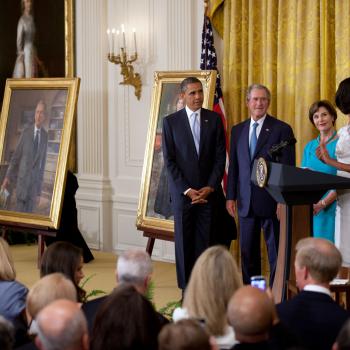So, look, I didn’t watch the speech last night, nor did I watch the Republican response. I supervised my middle son’s assembly of his science fair board and, just to relax a bit, read a couple chapters of the 5th Harry Potter that my youngest is currently reading.
I also haven’t read any of the commentary on the speech, since my morning so far has been spent, well, working, plus prepping a crock pot full of beef stroganoff. (Jewel had top round roast on sale for $2.77/lb.) But I’ve responded to all the e-mails that came in overnight, and (ugh!) now have to deal with the notification, once again, that I’ve exceeded my mailbox quota and have to delete before I can send anything. So — time to figuratively clock out for a break and blog. . .
Does Obama have anything new to say? Or is the the same tired laundry list of proposals and litany of complaints about Republicans (along with the calls for acceptance of Democratic Party policies masked as bipartisanship)? I’m not interested in the latter, so I’m going to sit down with the full text and look for the former.
Obama starts by saying “I want to focus on our future,” and says
Our unique strengths as a nation – our optimism and work ethic, our spirit of discovery and innovation, our diversity and commitment to the rule of law – these things give us everything we need to ensure prosperity and security for generations to come.
Well, you already know what I think of this trumpeting of diversity as a “strength” but that’s a battle for another day. He then claims that these strengths are
how we recovered from the worst economic crisis in generations. It’s how we reformed our health care system, and reinvented our energy sector; how we delivered more care and benefits to our troops and veterans, and how we secured the freedom in every state to marry the person we love.
Really? Has the VA been fixed? Does Obama not know that the so-called “freedom to marry” was the result of a Supreme Court decision, not legislation?
Anyway, he then says that technology has automated jobs and that, combined with globalization and the concentration of wealth and income at the top (which is more of an effect than a cause), make it harder on “hardworking families” to get out of poverty, for young people to start careers, for older folks to retire. Then he says, we’ve made progress with education but
In the coming years, we should build on that progress, by providing Pre-K for all, offering every student the hands-on computer science and math classes that make them job-ready on day one, and we should recruit and support more great teachers for our kids.
which reminds me to finish my draft post about computer programming education in schools. And he repeats is goal of free community college.
He also calls for “strengthening” Social Security and Medicare, which is the same line we’ve heard elsewhere about increasing Social Security benefits, but he provides no specific proposals, so perhaps that’s just a throwaway line. And — no surprise — he touts the ACA as providing protection in cases of job loss.
But here’s a paragraph worth noting:
Say a hardworking American loses his job – we shouldn’t just make sure he can get unemployment insurance; we should make sure that program encourages him to retrain for a business that’s ready to hire him. If that new job doesn’t pay as much, there should be a system of wage insurance in place so that he can still pay his bills. And even if he’s going from job to job, he should still be able to save for retirement and take his savings with him.
There’s a lot packed in here. There are lots of programs meant to help retrain workers — in fact, Republicans never tire of listing this as a failure of government, that there are far too many uncoordinated programs, operating wastefully and inefficiently. And it’s not clear to me that there should be special programs outside of the general financial aid system, anyway.
The phrase “wage insurance” struck me, too, because there is a real issue of individuals unwilling to accept lower-paying jobs, because it makes more financial sense to stay on unemployment which continuing to hunt for a better alternative — so some kind of short-term top-up would make sense. And if this is a long-term issue, this (perhaps unintentionally) supports the Republican approach towards helping low-income workers: rather than imagining that one can mandate a minimum wage high enough that all workers can “pay their bills,” provide wage subsidies for those who need it.
And the last item: portable retirement saving? Of course one’s own retirement savings are already portable. The only issue is that very short-term job holders don’t benefit from employer contributions to their 401(k)s due to vesting requirements. Does he propose to do away with vesting?
And immediately afterwards, he addresses the overall wage stagnation and says it’s the fault of greedy corporations:
Immigrants aren’t the reason wages haven’t gone up enough; those decisions are made in the boardrooms that too often put quarterly earnings over long-term returns.
Which seems to contradict his prior statement that it’s all the result of automation and globalization, and that all we need to do is retrain folks and properly educate ’em in the first place. And surely he can recognize that laying the blame solely on corporate greed is a bit old by now?
He announced his “moonshot” program:
Last year, Vice President Biden said that with a new moonshot, America can cure cancer. Last month, he worked with this Congress to give scientists at the National Institutes of Health the strongest resources they’ve had in over a decade. Tonight, I’m announcing a new national effort to get it done. And because he’s gone to the mat for all of us, on so many issues over the past forty years, I’m putting Joe in charge of Mission Control. For the loved ones we’ve all lost, for the family we can still save, let’s make America the country that cures cancer once and for all.
And I’m all for curing cancer, but a bit tired of this trope that if only we throw enough resources at something as we did at the moon landing (or the Marshall Plan), we can “get it done.”
He then moves on to climate change and “green energy” and takes credit for “gas under two bucks a gallon” (without mention of fracking), and then national security, saying that we are still “the most powerful nation on Earth” and that ” No nation dares to attack us or our allies because they know that’s the path to ruin,” but that we have to “set priorities.”
And the first priority is ISIL. But here he’s got a flaky arguement that I hadn’t heard before:
over-the-top claims that this is World War III just play into their hands. Masses of fighters on the back of pickup trucks and twisted souls plotting in apartments or garages pose an enormous danger to civilians and must be stopped. But they do not threaten our national existence. That’s the story ISIL wants to tell; that’s the kind of propaganda they use to recruit.
I suppose that’s the rationalization for saying that they’re just “junior varsity.” Then he claims we’re succeeding in destroying them, and claims as proof of an ongoing commitment to justice that “the perpetrator of the Benghazi attacks . . . sits in a prison cell.” (Really? that implies that there was a single perpetrator.)
He then repudiates nation-building as the “lesson of Vietnam, of Iraq” and says
Fortunately, there’s a smarter approach, a patient and disciplined strategy that uses every element of our national power. It says America will always act, alone if necessary, to protect our people and our allies; but on issues of global concern, we will mobilize the world to work with us, and make sure other countries pull their own weight.
and claims that this is what he’s doing in Syria that’s on it’s way towards success, and equally announces success in Iran:
That’s why we built a global coalition, with sanctions and principled diplomacy, to prevent a nuclear-armed Iran. As we speak, Iran has rolled back its nuclear program, shipped out its uranium stockpile, and the world has avoided another war.
“Avoided another war”? And in the meantime, Iran takes our sailors hostage!
He also touts success in Cuba:
Fifty years of isolating Cuba had failed to promote democracy, setting us back in Latin America. That’s why we restored diplomatic relations, opened the door to travel and commerce, and positioned ourselves to improve the lives of the Cuban people.
Does he forget that Cuba hasn’t actually implemented any reforms? Wishful thinking doesn’t make it so.
Oh, and he also claims that we “help[ed] Ukraine defend its democracy” which is I suppose technically true; it’s just that we didn’t do particularly much when Russia helped themselves to Crimea and western Ukraine.
Then he moves on to a call to “fix our politics” – never mind his role in breaking our politics to begin with. He says
But democracy does require basic bonds of trust between its citizens. It doesn’t work if we think the people who disagree with us are all motivated by malice, or that our political opponents are unpatriotic. Democracy grinds to a halt without a willingness to compromise; or when even basic facts are contested, and we listen only to those who agree with us.
Which is true enough — but he’s participated in those demonizations, and those refusals to compromise, plenty often. Pot, kettle.
And his solutions are: an end to gerrymandering (I’m all for that!), and “reduc[ing] the influence of money in politics” (is he willing to acknowledge that Democrats do this, too?), campaign finance reform, and easier, modernized voting. And he calls for Americans to vote, speak out, and get involved in public life.
He then concludes with words reminiscent of the very speech that first gained him recognition:
Our brand of democracy is hard. But I can promise that a year from now, when I no longer hold this office, I’ll be right there with you as a citizen – inspired by those voices of fairness and vision, of grit and good humor and kindness that have helped America travel so far. Voices that help us see ourselves not first and foremost as black or white or Asian or Latino, not as gay or straight, immigrant or native born; not as Democrats or Republicans, but as Americans first, bound by a common creed. Voices Dr. King believed would have the final word – voices of unarmed truth and unconditional love. . . .
That’s the America I know. That’s the country we love. Clear-eyed. Big-hearted. Optimistic that unarmed truth and unconditional love will have the final word. That’s what makes me so hopeful about our future. Because of you. I believe in you. That’s why I stand here confident that the State of our Union is strong.
And that’s that.
The bottom line?
Well, as Obama SOTUs go, it could have been a lot worse. Yes, it’s annoying that he claims credit for successes that, well, weren’t, and announces solutions that won’t solve anything, but what did you expect? And it would be nice if he would look in the mirror when he decries polarization, refusal to compromise, demonizing your opponent, etc., but, again, did you expect anything else? He even says “It’s one of the few regrets of my presidency — that the rancor and suspicion between the parties has gotten worse instead of better,” though he doesn’t actually take the next step to admitting that he did anything wrong but instead attributes this to not having the “gifts” of Lincoln or Roosevelt. But it’s better than nothing.












